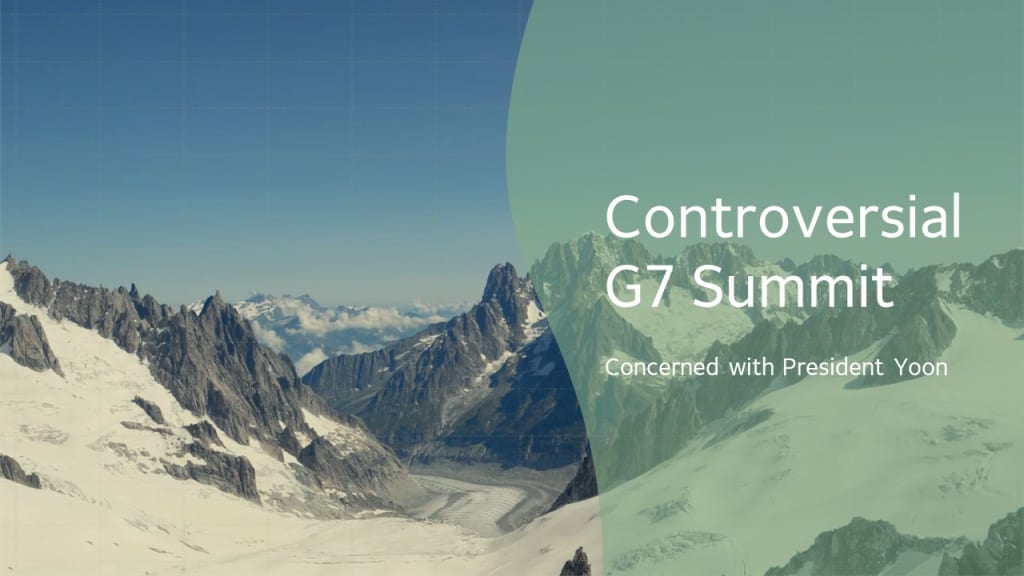
President Yoon Suk-yeol and the Controversial G7 Request
In a recent and highly unusual turn of events, President Yoon Suk-yeol has found himself at the center of a diplomatic storm. It has been reported that Japan has made a request to President Yoon, asking him to take a stand against China during the G7 summit. This unexpected request has raised eyebrows and generated a significant amount of debate.
President Yoon's Involvement in the G7 Request
President Yoon Suk-yeol's involvement in the G7 request has brought attention to his stance on the issue of changing the status quo of power, particularly in relation to Taiwan. Japan's request for President Yoon to confront China on this matter has sparked controversy and raised questions about the motivations behind such a request.
Japan's Request and the Controversy Surrounding It
The request made by Japan has been met with skepticism and criticism. Many argue that such a request goes beyond the norms of diplomacy and could be seen as an insult. The fact that Japan asked for President Yoon's involvement, rather than making a direct statement themselves, has added fuel to the controversy.
Historical Perspective on Diplomatic Relations
To better understand the implications of this request, it is important to consider the historical context of diplomatic relations between countries. Instances of one country requesting another to take a specific action are not unprecedented. However, the nature and implications of such requests must be carefully examined.
The Role of the President's Office in International Affairs
The involvement of the president's office in international affairs is a critical aspect of this situation. The actions and statements made by the president's office have a significant impact on the country's image and diplomatic relations. Understanding the role and responsibilities of the president's office is essential in comprehending the significance of this request.
The Concept of "Homework" in Diplomacy
The notion of "homework" in diplomacy raises intriguing questions. Comparisons can be drawn between the relationship dynamics of a teacher assigning homework to students and the request made by Japan. This comparison sheds light on the perceived power dynamics and the potential insult embedded within the request.
Comparison to High School Dynamics
Drawing further from the analogy of homework assignments, the comparison to high school dynamics highlights the contentious nature of the situation. The resentment felt by some towards those who boast about completing assignments they were given by a higher authority adds a layer of complexity to the controversy.
Criticisms of President Yoon's Role
President Yoon's role in this request has faced significant criticisms. Some argue that accepting such a request implies a subservient position, diminishing the stature of the presidency. Others question the practicality and effectiveness of such a move, particularly considering past instances of similar requests.
Psychological Analysis of President Yoon's Behavior
Delving into the realm of psychology, an analysis of President Yoon's behavior becomes relevant. Exploring possible motivations and emotions behind his
actions provides insights into his decision-making process. The examination of his favorite experiences and emotional reactions reveals potential factors that may have influenced his response to the G7 request.
The Stages of President Yoon's Emotional State
President Yoon's emotional state can be categorized into three distinct stages. The initial stage was characterized by excitement and joy, evident in his visible happiness upon assuming the presidency. However, this initial excitement began to wane as challenges arose, causing a shift towards anxiety and insecurity. The subsequent stage brought about a renewed sense of excitement as external assurances of support and protection were received.
The Impact of External Influences on President Yoon's Actions
External influences, such as the validation and praise received from the United States and Japan, played a significant role in shaping President Yoon's actions. The desire for recognition and approval from powerful nations appears to have had a profound effect on his decision-making process and emotional state.
Reflection on President Yoon's Self-Perception
President Yoon's perception of himself as a great person, regardless of external opinions, sheds light on his self-confidence and determination. This self-perception may have contributed to his willingness to take on the request made by Japan, as he believed in his own abilities and saw it as an opportunity to showcase his leadership.
The Potential Consequences of President Yoon's Actions
The consequences of President Yoon's actions in response to Japan's request are multifaceted. Diplomatic repercussions, both positive and negative, may arise from his involvement in the G7 summit and his stance against China. Additionally, his decision and subsequent statements have the potential to further strain relationships with neighboring countries, including China.
Conclusion
The controversy surrounding President Yoon Suk-yeol's involvement in the G7 request has sparked intense discussions and debates. From examining the historical context to delving into the psychological factors that influenced his decision-making, it becomes clear that this situation carries significant implications for both domestic and international affairs. Understanding the complexities of diplomacy and the interplay of personal motivations and external influences is crucial in comprehending the actions of President Yoon and their potential consequences.
________________________________________
1. Is President Yoon Suk-yeol the first Korean president to receive such a request? No, instances of one country requesting another to take a specific action are not unprecedented in diplomatic history. However, the nature and implications of each request vary.
2. How has President Yoon's involvement in the G7 request been received by the Korean public? Opinions among the Korean public are divided. Some view his involvement as a demonstration of leadership and a step towards asserting Korea's position on the global stage. Others criticize his decision, questioning its effectiveness and potential negative consequences.
3. What are the potential diplomatic repercussions of President Yoon's actions? The potential diplomatic repercussions are complex and depend on various factors. They could range from strained relations with China to potential alliances or support from other nations involved in the G7 summit.
4. What role do external influences play in President Yoon's actions? External influences, such as the validation and praise received from powerful nations like the United States and Japan, have played a significant role in shaping President Yoon's actions. The desire for recognition and approval appears to have had a profound effect on his decision-making process and emotional state.
About the Creator
Ahron
The blog is to helping you live an active and healthy lifestyle!
Youtube Channel: https://www.youtube.com/channel/UCrglZ6wWRNyjrtxtcCSTu9w





Comments
There are no comments for this story
Be the first to respond and start the conversation.